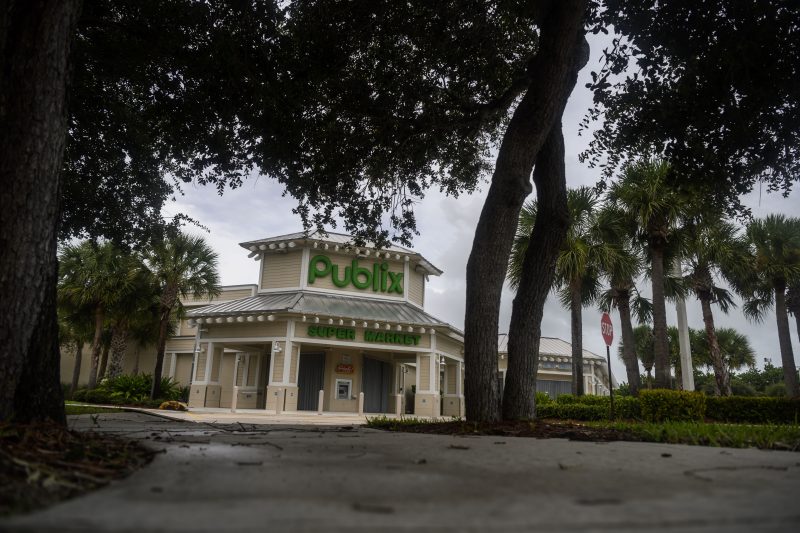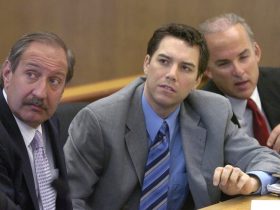Groups under the direction of pro-Trump activist Charlie Kirk received $1.25 million. Alex Jones, the conspiracy theorist and far-right media personality, scored $200,000. Roger Stone, the Trump adviser and self-proclaimed “dirty trickster,” received funds to fly privately to Washington.
This money — aimed at financing protest activity on Jan. 6, 2021, that preceded the deadly attack on the U.S. Capitol — came from Julie Fancelli, a daughter of the founder of the Publix grocery store chain.
In all, Fancelli, 73, was willing to shell out as much as $3 million to people and groups protesting congressional certification of Joe Biden’s victory, according to a transcript of her interview before the House panel probing the siege on the Capitol. It appears that not all of the money ultimately backed activities related to Jan. 6; at least some funds went to a PAC devoted to the runoff elections in Georgia in January 2021.
Fancelli, who keeps a low public profile, did not respond to a request for comment. Asked in the interview whether she intended the rally on Jan. 6 to be anything but peaceful, Fancelli responded, “No.”
The transcript was among 34 released Wednesday by the House select committee investigating the Jan. 6 attack on the Capitol. Transcripts of interviews with Kirk, Jones and Stone — all of whom invoked their Fifth Amendment right to avoid self-incrimination — also were released. The committee’s full report is expected Thursday.
The Washington Post previously reported that the Publix heiress was the largest publicly known donor to the rally — and had wired $650,000 to numerous groups behind the “Stop the Steal” organizing. But the interview transcript, which cites wire transfers as well as text messages and other communications involving Fancelli, shows her role was greater than previously known. When a Trump aide learned that Fancelli had offered a budget of $3 million, he wrote in a text message, “rich people are so odd.”
The documents also provide greater insight into Fancelli’s motivation for financing the activities, including personal devotion to Jones and Stone — about whom she repeatedly inquired, wanting to hear them speak on Jan. 6 — as well as faith in Kirk’s organizing capacities. “Where are Roger and Alex speaking?” she texted Caroline Wren, a veteran GOP fundraiser who facilitated the donations from her, according to the interview transcript. Wren declined to comment.
Text messages cited by the committee show Wren praised Kirk to Fancelli, saying he was successfully mobilizing people for the protest. “Charlie Kirk is my hero,” she wrote.
After initially directing $1 million to Kirk’s groups — $250,000 to Turning Point USA and $750,000 to its political arm, Turning Point Action — Fancelli urgently instructed her assistant on Jan. 4, 2021, to send him more money.
“I need you to send $250,000 to Charlie Kirk ASAP,” she wrote, according to an email presented to her by a committee investigator.
She added, “It is for busing in more people.”
Kirk tweeted on Jan. 4 — but later deleted — a promise that his organization was sending 80 buses to “fight for this president.” On the morning of Jan. 3, a website publicizing the rally listed Turning Point Action as a “coalition partner,” along with numerous other groups supported by Fancelli, including the nonprofit arm of the Republican Attorneys General Association and Women for America First.
Turning Point representatives subsequently said the group’s involvement in the rally included sending only seven buses with about 350 people to Washington. Emails cited by the committee suggest there may have been only five buses, and that people traveling on them were asked to download Telegram, the secure messaging app that makes it easy to purge messages, to stay apprised of logistics.
A Turning Point spokesman did not respond to a request for comment.
Kirk personally avoided the rally on Jan. 6, saying in a text message cited by the committee when he appeared under subpoena, “I am not speaking at the event.” Additional evidence cited in his interview before the committee suggests the involvement of his groups came about suddenly.
In late December, he told Wren his plans included “nothing” for Jan. 6. But messages included in his interview show that when asked how he could put Fancelli’s money to use, he replied, “An investment of $1,250,000 for TPA will allow us to deploy social media influencers to Washington, D.C., on Jan. 6, produce high-quality … video content that will educate millions about the significance of Jan. 6, mobilize students to fight against voter fraud, as well [as] help expand Turning Point Action’s campus army toward the President’s America first goals/objectives.”
Turning Point used $60,000 of Fancelli’s money to cover a speaking fee for Kimberly Guilfoyle, Donald Trump Jr.’s fiancee, who briefly addressed the crowd gathered at the White House Ellipse on Jan. 6. The payment was issued despite Fancelli and her associate removing a line item in the budget for speaking fees, according to the transcript.
A committee investigator asked Kirk if the fee was actually intended to cover speeches at a Turning Point conference the previous December, but he invoked the Fifth Amendment, as he did in response to virtually all questions.
Communications cited in Fancelli’s interview indicate that Guilfoyle later became concerned about her perceived role in rally organizing. A committee investigator presented a message from Fancelli in which the Publix heiress alerted staffers in October 2021 that Guilfoyle had called her and asked her to “release a statement that she didn’t ask for funds for Jan. 6, which isn’t true!”
Guilfoyle did not respond to a request for comment.
Documents produced by Fancelli’s family office — and cited in the interview — indicate she paid for a private jet transporting Stone, the longtime Trump consigliere, from Fort Lauderdale, Fla., to Washington on Jan. 5, 2021. An email from one of Fancelli’s associates states that Jones, the far-right media figure who spread conspiracy theories about the Sandy Hook school shooting, was to use $50,000 of his allotted $200,000 for the “rally operating budget.”
Fancelli, who appeared before the committee under subpoena, declined to answer most questions, repeatedly citing the Fifth Amendment’s protection against self-incrimination. She did state, however, that she was not in Washington for the rally, instead learning about the event from her home in Lakeland, Fla., as the pro-Trump mob breached the Capitol.
“Who were the people that ‘stormed’ the chamber? Antifa?” Fancelli asked Wren, referring to far-left political activists falsely blamed for the violence. Wren responded by texting a video of people swarming the Capitol grounds, according to the transcript.
Fancelli’s fortune comes from the Publix supermarket chain, which has sought to distance itself from her support for the pro-Trump rally. Based in her hometown of Lakeland, Publix touts its reputation for customer service with a decades-old “where shopping is a pleasure” slogan. Last year, in response to inquiries from The Post, the company said it “cannot control the actions of individual stockholders” and issued an unusual rebuke of a member of the founder’s family.
“We are deeply troubled by Ms. Fancelli’s involvement in the events that led to the tragic attack on the Capitol on Jan. 6,” the company said in a statement at the time.
Fancelli has given hundreds of thousands of dollars to GOP candidates and party organizations over the past two decades but did not become a top-tier donor until Trump moved into the White House, records show.








